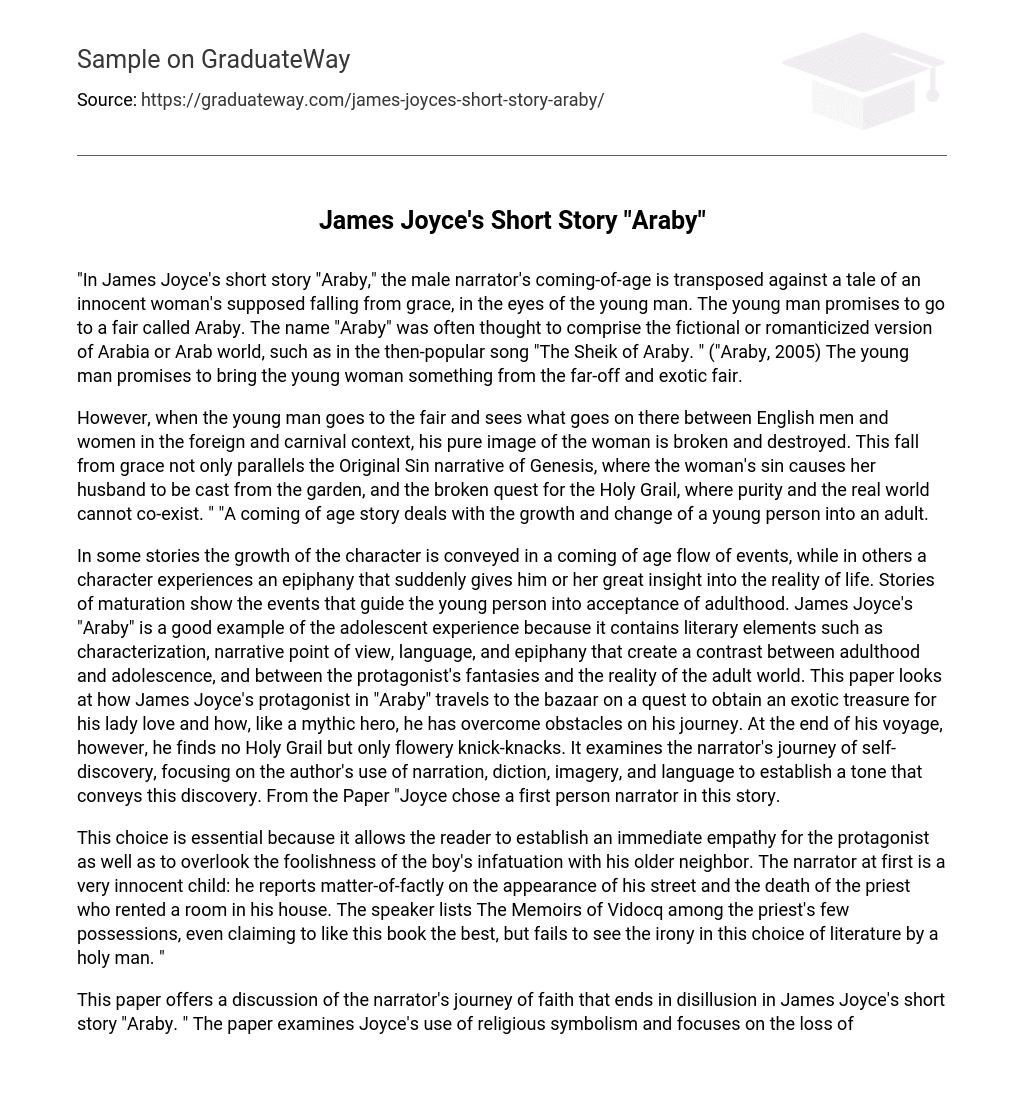In James Joyce’s short story “Araby,” the male narrator’s coming-of-age is contrasted with the tale of a woman who is believed to have lost her innocence, according to the young man. The young man commits to going to a fair called Araby, which is thought to be a fictionalized or idealized version of Arabia or the Arab world, similar to the song “The Sheik of Araby.” The young man pledges to bring the young woman a gift from this distant and captivating fair.
The young man’s idealistic view of women is shattered when he attends the fair and witnesses the interactions between English men and women in a foreign and carnival-like setting. This downfall parallels both the story of Original Sin in the book of Genesis, where Eve’s sins result in her husband being expelled from paradise, and the failed quest for the Holy Grail, where purity and reality cannot coexist. The event at the fair represents a coming-of-age story that explores the transformation and maturation of a young individual into an adult.
The paragraph discusses the portrayal of character growth in stories, either through a coming of age narrative or a sudden epiphany. It mentions that stories about maturation depict events leading young people towards adulthood. The example given is James Joyce’s “Araby”, which contrasts adulthood with adolescence and explores the protagonist’s fantasies versus the realities of the adult world by using elements like characterization, point of view, language, and epiphany. The paper analyzes how the protagonist embarks on a quest to obtain a treasure for his love interest but only finds flowery knick-knacks instead of what he hoped for. It focuses on the narrator’s journey of self-discovery and examines how narration, diction, imagery, and language establish a reflective tone. The paper also notes that Joyce chose a first person narrator for this story.
The significance of this decision lies in its ability to promptly evoke empathy for the protagonist and overlook the boy’s foolish infatuation with his older neighbor. At first, the narrator is a naïve child who candidly depicts the appearance of his street and recounts the passing of a priest who had occupied a room in his house. The narrator lists out the priest’s possessions, including a fondness for The Memoirs of Vidocq, unaware of the irony inherent in a religious figure selecting such literature.
This article presents an analysis of the protagonist’s voyage of religious belief in James Joyce’s “Araby”. It explores the utilization of religious symbolism by Joyce and emphasizes the protagonist’s disillusionment. In “Araby” by James Joyce, a young man’s maturation process leads to a heightened fascination with the opposite gender. The young man’s enchantment with Mangan’s daughter becomes a fantastical and enchanting encounter. This encounter directs his attention towards Araby, where he anticipates the fulfillment of his dreams.
In the short story “Araby” by James Joyce, a young man attends a bazaar called Araby in Dublin with hopes of finding a meaningful gift for his beloved. Set before the turn of the century, the narrative delves into the protagonist’s inner thoughts and emotions rather than external happenings. It mirrors Joyce’s own yearning as a youth to recognize and cherish beauty that he perceived as an ideal. At first, this ideal took form in Mangan’s sister, whom he glimpsed from a distance and immediately became enthralled by.
The author’s portrayal of his eager watching for a glimpse of her is filled with idealistic yearning and a romantic sensibility. Although he was too young to understand what love was at the time, he found himself enslaved by its powerful force. He anxiously awaited even the smallest touch or communication from her. Eventually, they spoke and he promised to bring her a gift from Araby. He eagerly awaited the opportunity to fulfill his promise. In addition to this yearning, he also longed deeply to go to Araby, a festival that held an enchanting allure of romance and beauty for him.
After setting a date to go to Araby, the boy asked for his uncle’s permission. The allure of Araby captivated him and enticed him. He eagerly anticipated his visit, viewing his daily obligations as mere distractions from his life’s purpose. Mangan’s sister and Araby appeared to the boy as the holy grail in the medieval legend that inspired adventurous knights to embark on dangerous quests. Just like those knights, the boy’s young and immature mind was intrigued, and he patiently awaited something he could never obtain or enjoy.
In this tale, a boy eagerly anticipates and yearns for an unattainable love and the enchanting allure of grandeur and beauty. However, his experience at the Araby bazaar proves deeply disappointing. Despite his high hopes, he realizes that his expectations were merely illusions. Furthermore, he is unable to satisfy his desire for the Great Oriental Grandeur or fulfill his promise of bringing a gift for Mangan’s sister.
In leaving the place, he experienced utter anguish and anger as his dreams were shattered. The story’s theme explores the unholy union between the gritty reality of metropolitan life and the romantic yearning of a young heart, which both attracts and deceives. “Araby” carries a symbolic undertone that highlights the frustration experienced by individuals in their pursuit of their deepest desires. Ultimately, the unifying aspect of human existence is the anguish and frustration encountered along this quest for fulfillment.





